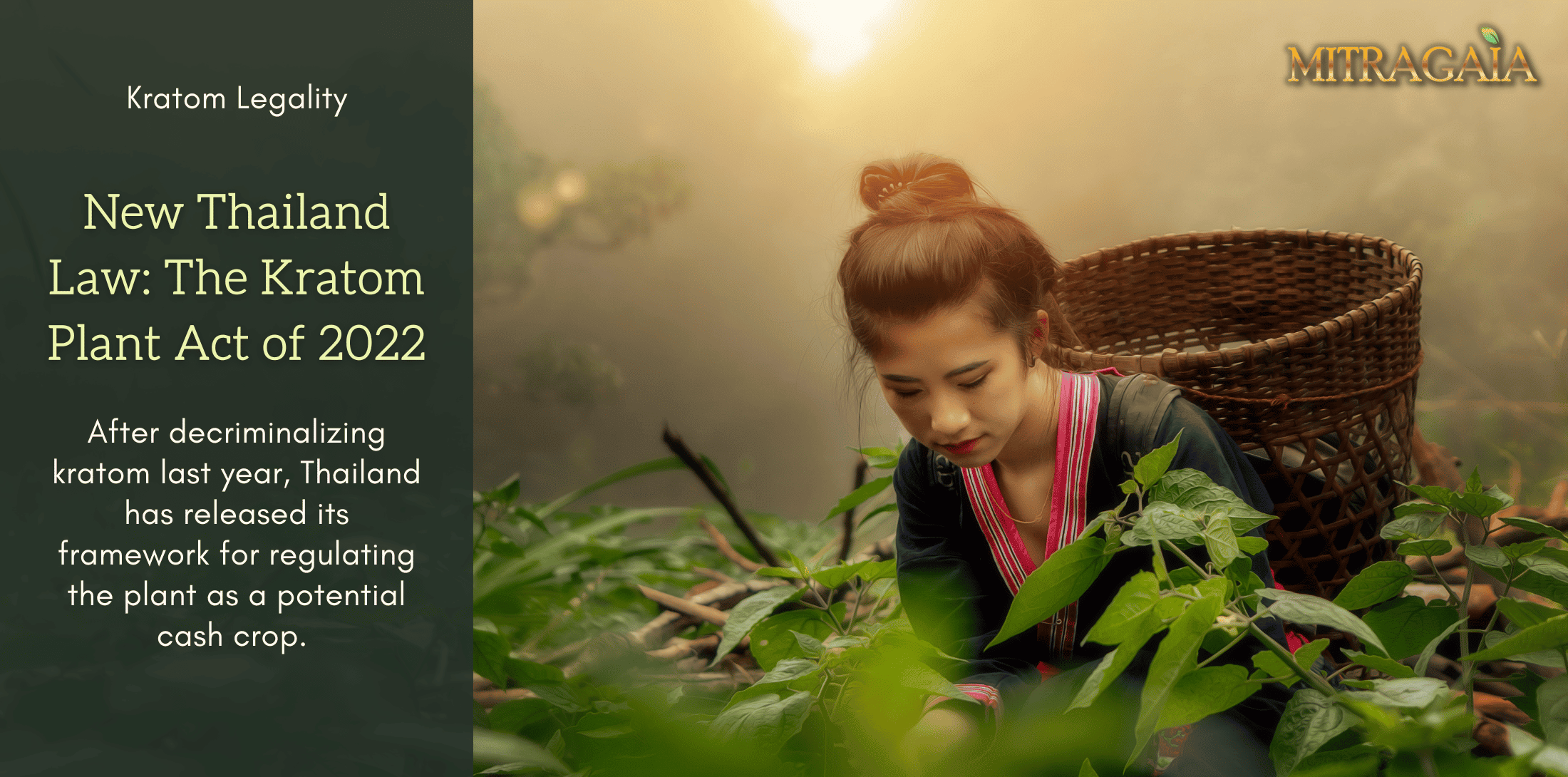 Tremendous news hit the kratom community last year when on August 24, 2021, Thailand passed the updated Narcotics Act, which removed kratom from the list of prohibited substances, making the plant legal.
Tremendous news hit the kratom community last year when on August 24, 2021, Thailand passed the updated Narcotics Act, which removed kratom from the list of prohibited substances, making the plant legal.
Recently, Thailand has taken further legal steps to regulate kratom sales and consumption in the country. Despite this new legal framework, there are still restrictions on the plant in various industries; further research and legal guidelines are needed to expand kratom as a potential cash crop in Thailand.
So, what does this new kratom law mean for Thailand, and what challenges remain for the Thai kratom industry? Let’s get into what you need to know about the legality of kratom in Thailand this year.
Recap: After a 42-Year Long Ban, Kratom Became Legal in Thailand
Previously, Thailand had restricted the use and propagation of kratom trees since 1943, and decades later, Thailand proceeded to ban kratom sales, imports/exports, and consumption in the Narcotics Act 1979.
After Thailand decriminalized kratom in 2021, over 10,000 offenders and inmates were released from prison in 1,083 jails across the country. The released prisoners, who had been arrested on kratom-related charges, would be cleared as having never committed such an offense. Villagers would no longer have to fear being arrested for being caught chewing kratom leaves, a traditional method of consumption.
Not only did the prisoners finally get to return to their lives free of any kratom-related charges, but decriminalizing the plant would save authorities about 1.69 billion baht (US$50 million) in prosecution costs, according to a Thailand Development Research Institute study.
The Kratom Plant Act of 2022: Regulation Framework
Fast forward to about a year later—on August 26, 2022, Thailand published the Kratom Plant Act B.E. 2565 (2022) in the Government Gazette, and the law took effect the following day.
The act, which aims to improve Thailand’s economic activity from kratom, regulates the trade, sale, consumption, research, and marketing of kratom leaves in Thailand. The law introduces a set of legal restrictions pertaining to kratom sales/consumption in its guidelines.
Some of the new restrictions in the Kratom Plant Act of 2022 include:
Importing/Exporting:
- Allows kratom leaves may be sold alone or as an ingredient in food, subject to certain conditions
- Requires those looking to export/import kratom to seek a license. License-holders are required to be Thai nationals over the age of 20 years old and residing in Thailand for obtainment.
Violation of these requirements is subject to imprisonment for up to one year, a maximum fine of THB 100,000, or both.
Selling Kratom:
- Prohibits kratom sales to persons under 18 years old, and pregnant or breastfeeding women, with the exception of medical or educational purposes
- Prohibits kratom from being sold in educational institutions, dormitories, parks, zoos, amusement parks, vending machines, or other places specified in announcements by ministers of the Ministry of Justice and the Ministry of Public Health
Violation is subject to a maximum fine of THB 50,000
Advertising:
- Prohibits advertising or promoting the consumption of kratom leaves mixed with narcotics or psychotropic substances, drugs and dangerous substances, or other prohibited substances
- Prohibits misleading/deceiving customers into buying kratom adulterated with harmful substances.
Violations of the marketing guidelines are subject to imprisonment for up to two years, a maximum fine of THB 200,000, or both.
Going Forward, Further Legal Developments and Research Needed
The Kratom Act of 2022 lays out a framework that allows for kratom sales and consumption within certain limits. It allows citizens to grow and sell kratom plants as the government works on plans to eventually develop the plant as a cash crop eventually.
That being said, the plant is still subject to further restrictions in different industries and specific laws, such as the Herbal Product Act or Cosmetics Act. Thus, Thai kratom vendors still face challenges entering the market with their products.
Going forward, The Ministry of Justice will work with the Thai (FDA) to further develop and allow the use of kratom leaves in food, herbal and cosmetic products. Additionally, according to Warawut Sermsinsiri, FDA Strategy and Planning Division Director of Thailand, a research team will be formed to assess kratom studies conducted internationally and in Thailand to ensure that the herb or its extracts are not harmful to human health.

thats beautiful. go Thailand 😀 i feel like this is their equivalent of california legalizing cannabis. so good to hear people are being released from prison. no one deserves to live in a cage for selling a leaf that helps people.